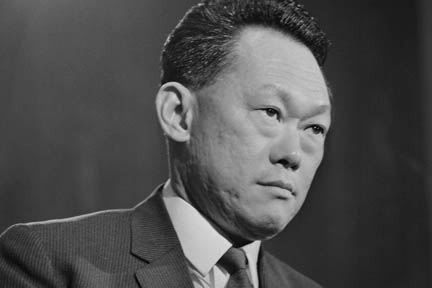
| Lee Kuan Yew GCMG CH SPMJ |
|
|---|---|

Lee in 2000
|
|
| Minister Mentor of Singapore | |
| In office 12 August 2004 – 21 May 2011 |
|
| Prime Minister | Lee Hsien Loong |
| Preceded by | Position established |
| Succeeded by | Position abolished |
| 1st Senior Minister of Singapore | |
| In office 28 November 1990 – 12 August 2004 |
|
| Prime Minister | Goh Chok Tong |
| Preceded by | S. Rajaratnam |
| Succeeded by | Goh Chok Tong |
| 1st Prime Minister of Singapore | |
| In office 3 June 1959 – 28 November 1990 |
|
| President | Yusof Ishak Benjamin Sheares Devan Nair Wee Kim Wee |
| Governor | Sir William Goode |
| Deputy | Toh Chin Chye Goh Keng Swee S Rajaratnam Goh Chok Tong |
| Preceded by | Lim Yew Hock (as Chief Minister) |
| Succeeded by | Goh Chok Tong |
| 1st Secretary-General of the People's Action Party | |
| In office 21 November 1954 – 1 November 1992 |
|
| Preceded by | Position established |
| Succeeded by | Goh Chok Tong |
| Member of Parliament for Tanjong Pagar GRC Tanjong Pagar SMC (1965–1991) |
|
| In office 9 August 1965 – 23 March 2015 |
|
| Preceded by | Parliament established |
| Succeeded by | Indranee Thurai Rajah |
| Member of the Legislative Assembly for Tanjong Pagar | |
| In office 2 April 1955 – 9 August 1965 |
|
| Preceded by | Constituency established |
| Succeeded by | Legislative Assembly renamed to Parliament of Singapore |
| Personal details | |
| Born | 16 September 1923 Singapore, Straits Settlements |
| Died | 23 March 2015 (aged 91) Singapore General Hospital, Singapore |
| Cause of death | Pneumonia |
| Resting place | Mandai Crematorium |
| Citizenship | Singaporean |
| Nationality | Singaporean |
| Political party | People's Action Party (1955–2015) |
| Spouse(s) | Kwa Geok Choo (m. 1950; d. 2010) |
| Children |
|
| Mother | Chua Jim Neo (mother) |
| Father | Lee Chin Koon (father) |
| Alma mater | Raffles Institution London School of Economics Fitzwilliam College, Cambridge |
| Lee Kuan Yew | |||
Lee's name in Chinese characters
|
|||
| Chinese | 李光耀 | ||
|---|---|---|---|
|
|||
Lee Kuan Yew GCMG CH SPMJ (16 September 1923 – 23 March 2015), commonly referred to by his initials LKY, was the first Prime Minister of Singapore, governing for three decades. Lee is recognised as the nation's founding father, with the country described as transitioning from the "third world to first world in a single generation" under his leadership.
After attending the London School of Economics, Lee graduated from Fitzwilliam College, Cambridge University, with double starred-first-class honours in law. In 1950, he became a barrister of the Middle Temple and practised law until 1959. Lee co-founded the People's Action Party (PAP) in 1954 and was its first secretary-general until 1992, leading the party to eight consecutive victories. After Lee chose to step down as Prime Minister in 1990, he served as Senior Minister under his successor, Goh Chok Tong until 2004, then as Minister Mentor (an advisory post) until 2011, under his son Lee Hsien Loong. In total, Lee held successive ministerial positions for 56 years. He continued to serve his Tanjong Pagar constituency for nearly 60 years as a Member of Parliament until his death in 2015. From 1991, he helmed the 5-member Tanjong Pagar GRC, and was returned unopposed for a record five elections.
Lee campaigned for Britain to relinquish its colonial rule, and eventually attained through a national referendum to merge with other former British territories to form Malaysia in 1963. But racial strife and ideological differences led to its separation to become a sovereign city-state two years later. With overwhelming parliamentary control at every election, Lee oversaw Singapore's transformation from a stagnant British crown colony with a natural deep harbour to an Asian Tiger economy. In the process, he forged a system of meritocratic, highly effective and incorrupt government and civil service. Many of his policies are now taught at the Lee Kuan Yew School of Public Policy.
Lee eschewed populist policies in favor of pragmatic long-term social and economic measures. With meritocracy and multiracialism as governing principles, Lee made English the common language to integrate its immigrant society and to facilitate trade with the West, whilst mandating bilingualism in schools to preserve students' mother tongue and ethnic identity. Lee's rule was criticised, for curtailing civil liberties (public protests, media control) and bringing libel suits against political opponents. He argued that such disciplinary measures were necessary for political stability, which together with rule of law, were essential for economic progress.
On 23 March 2015, Lee Kuan Yew died of pneumonia, at 91. In a week of national mourning, 1.7 million residents and guests paid tribute to him at his lying-in-state at Parliament House and at community tribute sites around the island. (wikipedia)

